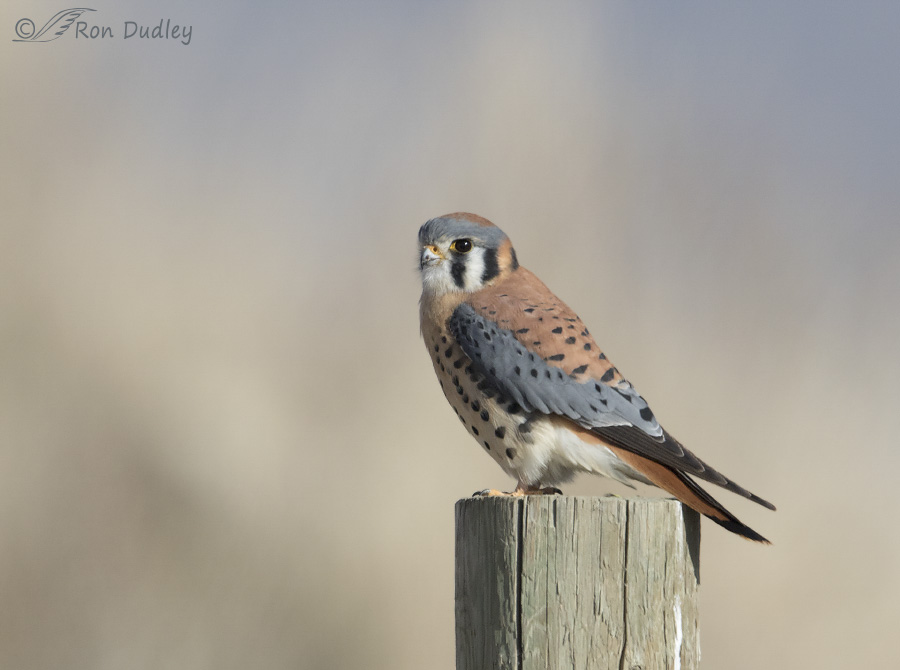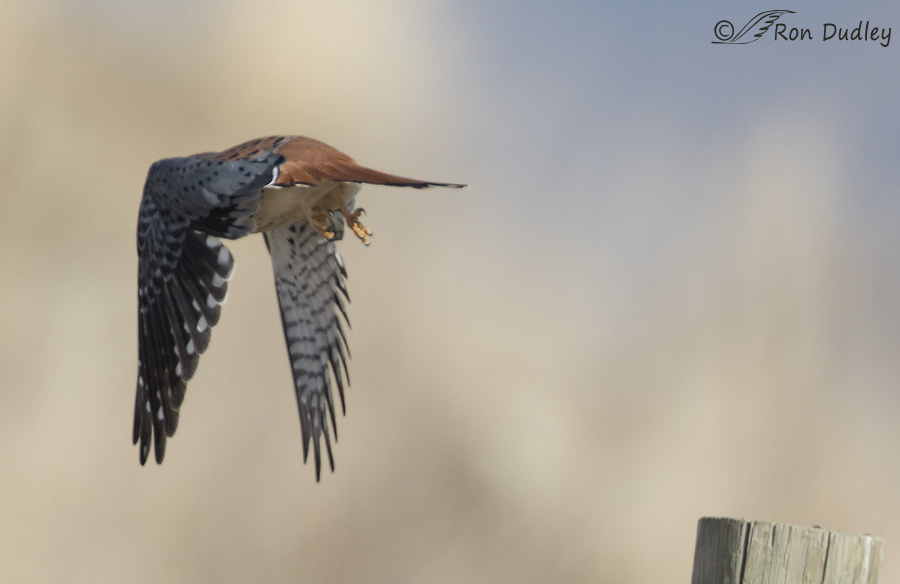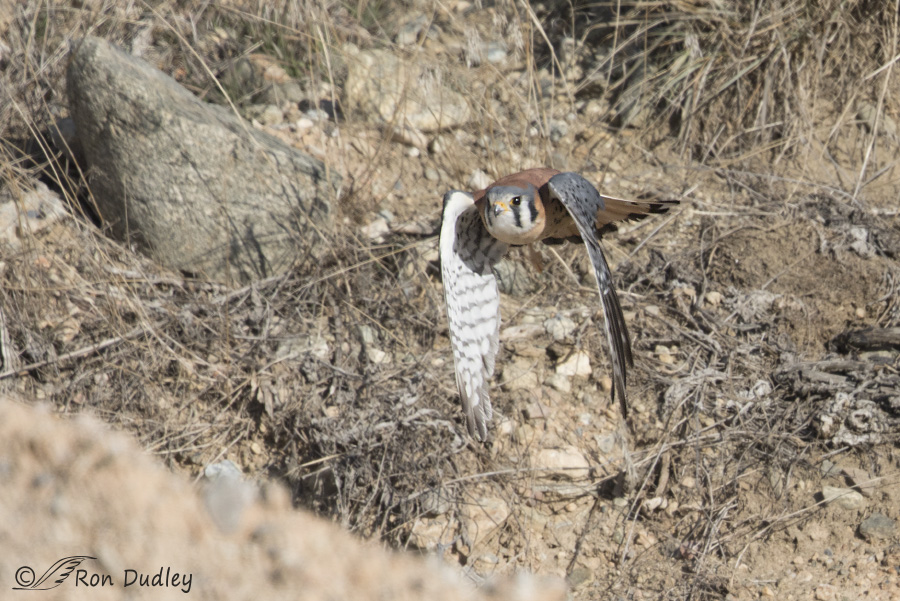After all the time I’ve spent in the field watching and photographing birds and their behaviors I still occasionally see something that surprises me. This time I wasn’t able to photograph the actual behavior (there is no meadowlark in any of these images) but I still wanted to post the kestrel and describe what I observed.

1/3200, f/7.1, ISO 500, Canon 7D Mark II, Canon EF 500mm f/4L IS II USM + 1.4 tc, not baited, set up or called in
I photographed this male American Kestrel yesterday morning at Farmington MBR. He was perched in good light, he stood his ground as I approached and I like the wispy background that includes fall vegetation colors and blue sky. It’s just a simple image that I like even though I wish I’d been a little closer to the bird.
He only gave me a few seconds to photograph him before he…

1/4000, f/7.1, ISO 500, Canon 7D Mark II, Canon EF 500mm f/4L IS II USM + 1.4 tc, not baited, set up or called in
took off after apparent prey on the ground just a few feet from the post he had been perched on (as per usual he took off away from me…). As he was on the ground and before I could get my lens trained on him a Western Meadowlark attacked him. The attack didn’t appear to be typical mobbing behavior where songbirds harass a raptor but keep a safe distance. This meadowlark appeared intent on doing bodily harm to the little falcon.

1/3200, f/6.3, ISO 500, Canon 7D Mark II, Canon EF 500mm f/4L IS II USM + 1.4 tc, not baited, set up or called in
The kestrel took off to escape the meadowlark. It all happened so fast that I had no time to properly aim my lens so I simply pointed it (without looking through my viewfinder) in the general direction of the kestrel and fired off a short burst. Amazingly I caught the kestrel in the frame though it isn’t particularly sharp. The kestrel landed on the side of a nearby hill and was attacked again by the meadowlark so it flew off.
I thought the meadowlark was really gutsy to take on a kestrel so aggressively. Meadowlarks are quite large songbirds (almost as big as a kestrel, 97g vs 117g) but they’re not nearly as maneuverable in the air as a smaller passerine. When kestrels take on birds as prey they’re usually “small passerines” according to BNA Online (and in my own experience), although BNA does report a single anecdotal incident of a kestrel killing a Northern Flicker.
There’s nothing earthshaking here and I didn’t even get a photo of the meadowlark but I must admit that this behavior surprised me. Meadowlarks have long and very sharply pointed bills so maybe that potential weapon gave it the extra macho needed to make the attack…
Ron


I saw this photo series and it reminded me of the work that you do. I thought you might enjoy these photos: http://www.boredpanda.com/perfect-kingfisher-dive-photo-wildlife-photography-alan-mcfadyen/
Very impressive, Angela, especially considering how much time and effort it took to get that shot. I wish he’d included his image techs. I’d love to know his shutter speed…
Beautiful pictures Angela. Thank you for the link.
Ron I love your pictures. Especially the one of the Kestrel flying low. They have a wide wing span for a small bird. I too am surprised about the Meadowlark’s behavior. My first thought was “maybe it had to do with food”, but Meadowlarks eat insects etc. Then I found this. “During hard winters, they (Meadowlarks) may even feed at carcasses such as roadkill” Interesting, so my theory might be right. Just a thought.
Have a wonderful Thanksgiving everyone!
Jean, It’s amazing what some birds will eat in order to survive harsh winters. I once photographed a Song Sparrow eating fish on the ice. If you’re interested in the image see the link below and scroll down to the end.
https://www.featheredphotography.com/blog/2011/03/20/fish-eating-northern-harriers/
Thank you Ron for the link. The Song Sparrow had a feast lol. Mother Nature always has a surprise up her sleeve, and thank goodness you are there to capture the surprises. Don’t eat too much Turkey hehe.
I am always amazed at the sheer gutsiness/bravado that some small birds show. Years back I watched a magpie attacking a wedge-tailed eagle. I saw it connect a few times too. In the end the eagle headed off, and the magpie sat on the fence post it had vacated. And warbled its glorious song.
Punching well over its weight. And it was winter, so there were no nestlings to protect.
Another great series. Thank you.
Interesting story, EC. Thank you for sharing it.
It’s fascinating to think about a songbird directly attacking a raptor, as opposed to mobbing. Clearly this is what happens when feisty meets feisty. I love the feistiness of American Kestrels, and I’m thinking now that it would be fun to get to know Meadowlarks, for the same reason. One thing I find interesting about this encounter is that, given the season, it’s unlikely that the Meadowlark was protecting babies or anything like that. So the behavior becomes even more unexpected.
Those are some of my own thoughts, Susan.
Wow! I’ve never even seen mobbing behavior from a meadowlark. Interesting story, thanks so much for this (and even though you apologize for your images, I think they are wonderful)
I like them too, Sharon – it’s just that two of them aren’t technically very good.
Interesting observation Ron. I would not have expected a Western Meadowlark to show this aggressive behavior to a Kestrel. It is not nesting season either, so it is probably not a nest protection. Very strange. Beautiful images of the kestrel.
I wouldn’t have expected it either, Ed. Live and learn…
Some fantastic shots Ron!
Charlotte
Thanks, Charlotte.
In my experience, a lot of surprising things happen in The Great Out There that humans haven’t yet seen! You just never know what’s going to happen out there
That’s for sure, Laura!
Interesting! I would never have thought of a Meadowlark as a bird that would attack! Wonderful detail on kestrel showing it’s colors and patterns. Have a great Thanksgiving – you have much to be thankful for – hopefully your daughter continues to progress even if slowly.
“I would never have thought of a Meadowlark as a bird that would attack!”
I know that meadowlarks can be fairly aggressive toward their own species, Judy, but this surprised me too. Thank you.
Napoleon complex in birds? Gutsy makes up for size difference? Or simply a predator, regardless of size, invading ones territory needs to be dealt with?
Do you think songbirds, instinctively know that they have a maneuverability advantage when confronting a predator head on; Or when they are dealing with the predator directly?
Very interesting observations and wonderful images.
“Do you think songbirds, instinctively know that they have a maneuverability advantage when confronting a predator head on”
It’s my guess that they do, Dick, though your word “instinctively” is key. I like your “Napoleon complex in birds”!
Was the meadowlark thrown off guard and attacked by instinct? Regardless you have to love those chance encounters! The first image is simply beautiful!
You just never know what you’ll see in the field, Nancy. Thank you.
Hi Ron,
All your shots look GREAT to me!
And have a wonderful Thanksgiving …
Linda
Thank you, Linda. You too!